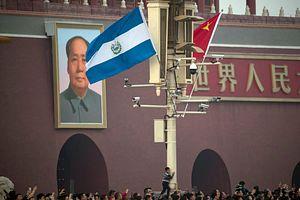Last week, Chinese Vice Minister Qin Gang met with Nayib Bukele in San Salvador to send congratulatory wishes from Xi Jinping ahead of Bukele’s inauguration as El Salvador’s new president. This fairly standard diplomatic move surrounding a power transition warrants a bit more unpacking, given that the People’s Republic of China and El Salvador have had formal diplomatic for less than a year.
In August 2018, El Salvador – under the leadership of President Salvador Sánchez Ceren — opted to sever diplomatic ties with Taiwan and officially recognize Beijing. Sánchez Ceren cited domestic economic concerns and international realities as the motivating factors behind the change in allegiance. The move was also followed by the promise a fruitful economic benefits in the form of pledged funds from China, notably a high profile commitment of $150 million in investment dedicated to the development of technological and social projects and thousands of tons of rice following droughts in 2018 that shook El Salvador.
Rhetoric from both sides has focused on deepening ties and the potential is clearly there: While China is El Salvador’s second largest import partner, it only ranks 11th among export partners, according to World Bank data. Moreover, the Central American country’s economic relationships with the United States and its other neighbors far outweigh that of China’s.
Since the diplomatic pivot, however, the general direction of relations between San Salvador and Beijing seems less linear. Bukele — a mayor in his late 30s outside of the political establishment — was elected in March and has been dubbed a maverick. He seems poised to redefine the future of his country’s relationship with Beijing. Since his electoral victory, he has been vocal about reassessing the newly minted El Salvador-China relationship, suggesting that he may be more resistant than his predecessor. As president-elect Bukele traveled to Washington, arguably the country’s most influential partner, to meet with National Security Advisor John Bolton and deliver a speech at the Heritage Foundation. During his visit he openly criticized Beijing’s investment loans and flouting of “the rules” of the international system. Notably, the Trump administration had condemned both El Salvador and the People’s Republic of China when the official diplomatic relationship was forged. The U.S. statement alleged Chinese interference in El Salvador’s domestic politics and criticized Beijing as a destabilizing force in the Americas.
Bukele is not alone in signaling some reticence vis-a-vis China. El Salvador’s Supreme Court temporarily suspended the severing of El Salvador’s free trade agreement with Taiwan in March, after the country’s sugar association sought an injunction, claiming that ending the pact would have a devastating impact on the industry. Sugar exports accounts for two-thirds of El Salvador’s exports to Taiwan, totaling tens of millions of dollars in trade. Separately, in May, Vice President Felix Ulloa reportedly said that El Salvador would not rule out the possibility of re-establishing ties with Taipei as the new leaders keep an eye on how ties with Beijing develop.
El Salvador’s about face followed Panama’s and the Dominican Republic’s breaks from Taiwan in June 2017 and May 2018, respectively. As Beijing makes inroads in Central America for formal diplomatic status, the emerging question is how long others in the region — including Belize, Guatemala, Honduras, and Nicaragua — will continue to recognize Taiwan and how much of a charm offensive will Beijing put on to wrest the island’s formal diplomatic partners. Media reports suggest that the Solomon Islands in Oceania may be next to make the switch, as it is currently reviewing its diplomatic relationship with Taiwan.
For the time being, domestic issues, such as corruption, poverty, and violence, are likely to be center stage of Bukele’s term, but Beijing’s overtures are sure to loom large. During his March visit to Washington, DC, Bukele said, “We want to be friends with China, but China has to be friends with us. I don’t mean money or investment, but respect.” Only time will tell how these remarks translate into action as he takes the helm and starts to govern – and whether another about-face by El Salvador will impact future decisions by Taiwan’s remaining diplomatic partners.

































